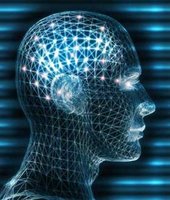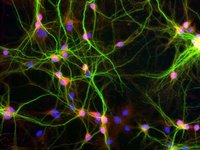Mind / Brain
 Is your mind something different from your brain or are they one and the same? Is your consciousness something that's merely dictated by the interaction of neurons and chemical processes in your head or is there something else?
Is your mind something different from your brain or are they one and the same? Is your consciousness something that's merely dictated by the interaction of neurons and chemical processes in your head or is there something else?There are no real concrete answers to these questions. For me, just thinking about it generates a million other questions... do we have a soul, is there an afterlife, so on and so forth.
Most people assume that there are two general attitudes that arise when trying to answer these questions. There's a spiritual/religious one involving a general faith in God and some underlying purpose to life and than one that involves scientific reasoning. Neither come close to explaining why humans are aware of themselves and faith isn't merely the domain of religion. Scientific explanations of mental processes and how they relate to consciousness also rely on basic assumptions that can't be proven. The lines are becoming more blurred these days as neuroscience and genetics tell us more, literally everyday, about how the biology of our bodies and particularly our brain works. The two new attitudes taking on these tough questions are more appropriately referred to as materialistic and non-materialistic.
There are many scientists today who believe that the brain is merely an instrument utilized by something (call it what you will) intangible to generate common experience. This isn't a scientifically proven fact, but is an assumption reached by a process of reduction. It's kind of like how the software on your computer is using the processor, monitor on your computer to produce the image of this webpage.
Many physicists believe that there is an underlying "intelligence" to nature, all the way down to sub-atomic particles... look up the Double Slit Experiment (another post).
None of these views are easily proven and they're often subject to much scrutiny by many people in the scientific community that see it as a slippery slope towards bad science. Many believe that the non-materialistic stance is extremely flawed because of it's reductionist point of view.... but there really isn't any way of explaining why our brains work the way they do (with our current knowledge) that doesn't take into account some kind of outside, unseen intelligence.
The point is that science and spirituality aren't two completely seperate things. They both attempt to explain the same mysteries and answer the same questions. It's nice to see them complement each other, narrowing the gap between faith in religion and faith in science.
Deepak Chopra, my favorite modern philosopher has been posting and debating about this for the last week on IntentBlog. His posts deal with genetics and how they relate to intelligence in the mind. Basic biology: genes map out the the structure of every cell in your body and influence or control (depending on which world view you subscribe to) the actions of cells, including the neurons in your brain. Here are some excerpts that I liked:
Basic science depends on certain assumptions that may not be tenable. These include:
1. The brain is the source of mind. Mind can't exist outside the brain. Intelligence is the result of chemical reactions.
2. In an even broader sense, life is the result of chemical reactions.

3. Genes are fixed, deterministic agents that do not respond to the immediate environment, bodily functions, or thoughts.
4. A complete biochemical analysis of DNA will eventually answer all questions about life.
5. Intelligence outside the brain is paranormal tripe, to use one objector's colorful language.
Despite the vehement objectors, I still believe that geneticists are far from understanding how DNA replicates, because the word "how" connotes more than observing a molecular process of chemical binding. Most explanations of DNA--not just its ability to replicate but many other factors--are post facto. We observe the process, therefore we think we understand its purpose. This is like observing the brain of someone who is depressed without knowing that the person had a child die that day. We cannot explain grief as a brain function. It is a human response that uses a physical organ to mediate it, just as an artist uses his hand to mediate his artistic vision. A chemical analysis of Michelangelo's hands can't explain the Pieta.
Genetics presently is approaching a remarkable mechanical understanding of its subject without advancing very far into the mystery of human intelligence, life in its relation to mind, consciousness in relation to the brain, and other fundamental questions. In a materialistic worldview, brain equals mind. This is far out of the mainstream of world philosophy and religion, not to mention wisdom and common sense. Consciousness, in the great human tradition, is a primary fact of existence, not an epiphenomenon created by brain chemistry.
In common understanding, we are intelligent because of our brains, our brains are intelligent because of the operation of brain cells, and brain cells operate because of genes. By this reasoning, either genes must be intelligent in their own right, or by some magic of chemistry, molecules that lack intelligence produce it when combined in various ways.
So, is this whole line of thinking false? To a materialist it must be true without question, and any attempt to find intelligence outside the brain--meaning outside DNA--is preposterous. Except that it isn't.
Consider the now-famous and much replicated studies at Princeton in which ordinary people were asked to sit in a room with a computer that generated a random string of zeros and ones.They were asked to try and will the machine to produce more ones than zeros or vice versa. In trial after trial the subjects succeeded in this challenge (on average, the machine produced extra ones or zeros about 2% more often than random), and there was no need for the subjects to have ESP or any paranormal abilities. This is a primary example of mind operating outside the brain.
We also have numerous examples of patients who died after cardiac arrest--to the point of exhibiting no brain function--only to be resuscitated and tell vivid accounts of the afterlife. They had mental experiences--seeing light, hearing voices, feeling emotions-- without brain activity. Are these cases to be denied wholesale?
----
He goes on to investigate the differences in genetically identical twins, and discussing the classic nature vs. nurture argument.
Read the rest here

0 Comments:
Post a Comment
<< Home